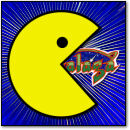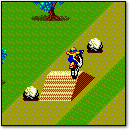[ Retro GIF of the Week ] Coca-Cola Classic
December 24th, 2012 by Benj Edwards Click to see other views of this image:
Click to see other views of this image:
[ Original Size ] [ 2X Zoom ]
In the BBS world of the late 1980s and early 1990s, one could easily find digital art that celebrated consumer brands, like the image of a Coke can seen here. In fact, I’d say brand art was a particularly distinctive genre of early computer art.
If I had to explain why brand art was so common, I’d first speculate that when people needed something to test out their imaging equipment with — say, a new scanner or a video digitizer card — an advertisement or product package was always at hand to be a guinea pig.
More importantly, consumer brands also inspire loyalty that consumers identify with personally. Think Doritos and Mountain Dew. Fans of those products like to spread their love of them as a cultural identifier, and the same was true in the 1980s and 1990s online space.
Image Origins
Now the real fun begins. Where did this image come from? I got it from an image compilation CD from the BBS era. Is appears to be a scanned promotional product photo of a Coca-Cola Classic can (remember that “Classic” distinguished from “Coke” in the New Coke era.) Coca-Cola company likely created the photo itself, and a fan of Coca-Cola scanned it.
Considering the image’s irregular size (227 x 425) when pared with its 8-bit color depth / 16 million color palette, and its file date of 1989, I’m going to guess strongly that this image originated on a Macintosh. Probably a Macintosh II family machine that could display 8-bit color with ease at high resolutions (640×480 was the most common).
Why a Mac in particular? Well, its irregular size (i.e. it’s not at a system resolution of say 320×200) means that it was likely composed in a windowed operating environment like Mac OS. Also, alternative platforms were not commonly capable of that color depth and palette size in 1989.
Windows was in a very primitive state at the time — it was on version 2.11 by late 1989, and Windows 2.11 was simply not flexible enough to be seriously used as a desktop publishing or graphic manipulation platform. Not only from its architecture but from a notable lack of applications for Windows during that period (note that Adobe Photoshop didn’t come to Windows until 1992).
Also, very few IBM PC compatible computers supported 8-bit color at resolutions higher than 320×200 (courtesy of VGA) in 1989. In the Mac world, however, which hosted many graphic design professionals, such hardware (while expensive) was much more common.
| Retro GIF of the Week Fact Box | |
| Source File Name: | coke.gif |
| Source File Date: | July 29, 1989 |
| Source File Format: | GIF – 87a (non-interlaced) |
| Dimensions: | 227 x 425 pixels |
| Color Depth (bits per pixel): |
8-bit (256 color) |
| Color Resolution (palette size): |
24-bit (16,777,216 colors) |
| Origin Platform: | Likely Apple Macintosh |
| Derived From: | Unknown |
| Creation Date: | Late 1980s |
| Artist: | Unknown |
| If you know more about the origin of this image, please leave a comment. | |






December 31st, 2012 at 7:16 pm
I thought that image looked familiar before I read the article text. I downloaded that image file in the late 80’s on my Commodore 64 from a local BBS. I’m not sure what the resolution and color depth was, but I remember being impressed with how good (or real!) it looked. I probably still have it on a disk in my big ole box of floppies.
January 5th, 2013 at 11:31 pm
I remember this high quality GIF. I used it as the source for an old, old experiment in punishing browsers. I imagine it isn’t quite the hardship it used to be:
http://www.cs.ubc.ca/~phillips/tricks/outofline/inline
If you look at the HTML source you’ll see it uses a 1×1 image to draw every single pixel of the original.
January 7th, 2013 at 3:35 pm
Very interesting, George. I loaded up your page in Firefox and it almost choked it up, but it ultimately came through and displayed the image correctly in the end. It took it a long time, though.